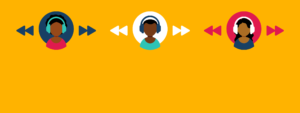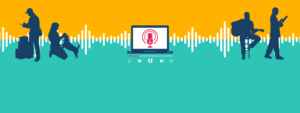Being a researcher is always most rewarding when we get to collaborate with smart people who want to learn something—not just checking off the research box, but really getting to some kind of truth.
This happened most recently in a brief research survey that came about in a rather out-of-the-box way. The study was a prize we offered to lure friends and clients to join us for a Happy Hour event at the Podcast Movement conference in Dallas this past August.
The winner of the study was Annalise Nielsen of Pacific Content. After some brainstorming with her colleagues, Annalise came up with an hypothesis for our study. There’s been a lot of handwringing in podcasting in 2022 around why, despite all the recent growth in podcast listening, there hasn’t been a new blockbuster podcast on the scale of Serial that drew so much attention to podcasting when it was released in 2014. Annalise had a theory she wanted to test with the podcast listeners we surveyed:
“Podcasts are powerful for reaching targeted audiences with niche interests, which is why we don’t see many podcast ‘blockbusters.’”
It turns out that Annalise pretty much hit the nail on the head. She does a great recap of the research on her Pacific Content blog including how powerfully engaging niche podcasts can be—you should read it. We’ve also made a full report of the study available here*.
Meanwhile, I’ve been thinking about the headline finding from the study:
Podcasts aren’t like most other media—unlike movies, listeners generally prefer podcasts that speak to them directly vs. “blockbuster” podcasts.
Stepping back from the research and looking strictly at cost structure, there’s a good reason for this. There’s an enormous gap in the barrier to entry for podcasts vs. movies. The Blair Witch Project aside, it’s virtually impossible to make a successful movie on less than several million dollars. That forces filmmakers to go big and broad, or go home. This in turn shapes audience expectations and the nature of the medium itself.
In contrast, you can make a perfectly successful podcast for a few hundred dollars in audio equipment.
When it comes to a business model, podcasts are more like blogs or newsletters than movies or other mainstream media. No one talks about “blockbuster” blogs. There’s a blog for everyone. Blogs or newsletters don’t even need to be monetized in the traditional sense. So long as they provide an effective platform to promote the blogger or the brand they represent, they can be a success. It’s much the same for podcasters (or YouTubers or Instagram influencers).
In fact, the vast majority of podcast listening happens outside the most popular podcasts. We see that in the surveys we conduct to support Triton Digital’s Podcast Metrics Demos+ initiative. Of the 12,269 surveys we completed from April 2021 to June 2022, a total of 12,235 different podcasts were mentioned. And only 35% of all survey mentions went to the Top 200 podcasts.
That said, hit podcasts have played a key role in podcasting. The promise of profits from hit podcasts has brought a lot of money into the podcasting ecosystem. Big players such as Spotify, Amazon, iHeart Media, and SXM Media have invested hundreds of millions of dollars into acquisition of podcast advertising rights for many of the most popular podcasts. The few “blockbuster” podcasts like Serial have also helped to serve as gateways, bringing new listeners into the medium.
So there is a yin and yang to podcasts. There’s plenty of room for both niche podcasts that speak to listeners’ personal passions and the hit podcasts that can fetch big ad dollars on their own.
Bestselling books might be a better model for podcasting success than movie blockbusters.
Of all media, books probably offer the most similar business model to podcasts. A long tail of specialty titles live comfortably alongside a smaller parcel of bestsellers.
Even some of the numbers look a little familiar. As many as 500,000 to a million books are estimated to be published each year, going up to four million if you include self-published titles. Meanwhile, the latest count for podcasts is approaching five million if you include a few million inactive podcasts.
Two lessons for podcasting from the more mature book industry: very few bestsellers are “blockbusters” with the kind of cross-cultural impact of the biggest movies; and books that sell a lot of copies without ever reaching a bestsellers’ list can still make a lot of money for their publishers. In fact, in case you never noticed, it’s those specialty titles that speak to reader’s personal interests that you are least likely to see marked down by 30% a few months after release.
*Study details: The Podcast Engagement Study was conducted using a market representative online survey of 416 Canadian adults who listened to a podcast in the past month. Survey dates were October 25th and 26th.




